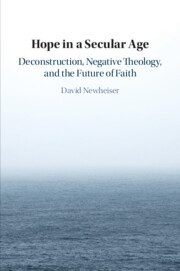Book contents
- Hope in a Secular Age
- Hope in a Secular Age
- Copyright page
- Epigraph
- Contents
- Acknowledgements
- Introduction
- Chapter 1 Deconstruction
- Chapter 2 Negative Theology
- Chapter 3 The Discipline of Hope
- Chapter 4 Beyond Indeterminacy and Dogma
- Chapter 5 Atheism and the Future of Faith
- Chapter 6 Negative Political Theology
- Conclusion
- Bibliography
- Subject Index
- References
Bibliography
Published online by Cambridge University Press: 31 January 2020
- Hope in a Secular Age
- Hope in a Secular Age
- Copyright page
- Epigraph
- Contents
- Acknowledgements
- Introduction
- Chapter 1 Deconstruction
- Chapter 2 Negative Theology
- Chapter 3 The Discipline of Hope
- Chapter 4 Beyond Indeterminacy and Dogma
- Chapter 5 Atheism and the Future of Faith
- Chapter 6 Negative Political Theology
- Conclusion
- Bibliography
- Subject Index
- References
- Type
- Chapter
- Information
- Hope in a Secular AgeDeconstruction, Negative Theology, and the Future of Faith, pp. 157 - 170Publisher: Cambridge University PressPrint publication year: 2019

